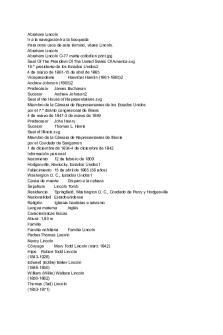Abraham Lincoln - Second Inaugural Address PDF

| Title | Abraham Lincoln - Second Inaugural Address |
|---|---|
| Author | Terence Girrel |
| Course | Mundos Anglófonos en Perspectiva Histórica y Cultural |
| Institution | UNED |
| Pages | 1 |
| File Size | 44.3 KB |
| File Type | |
| Total Downloads | 309 |
| Total Views | 496 |
Summary
Abraham Lincoln. Second Inaugural Address.President Abraham Lincoln was an American lawyer and statesman who served as the 16th president of the United States from 1861 until his assassination in 1865. On the 4th of March, 1865, only 41 days before his assassination, he took the oath of office for t...
Description
Abraham Lincoln. Second Inaugural Address. President Abraham Lincoln was an American lawyer and statesman who served as the 16th president of the United States from 1861 until his assassination in 1865. On the 4 th of March, 1865, only 41 days before his assassination, he took the oath of office for the second time. Lincoln's second inaugural address previewed his plans for healing a once-divided nation while addressing the whole country. Abraham Lincoln wrote his own speeches. Furthermore, this speech, together with the Gettysburg address, is engraved on the Lincoln Memorial. Abraham Lincoln was born on the 12th of February 1809 in Hodgenville, Kentucky. Lincoln was born into poverty in a log cabin in Kentucky and was raised on the frontier, primarily in Indiana. He was self-educated and became a lawyer, Whig Party leader, Illinois state legislator, and U.S. Congressman. In 1849, Lincoln returned to his law practice but became vexed by the opening of additional lands to slavery due to the Kansas–Nebraska Act of 1854. He reentered politics in 1854, becoming a leader in the new Republican Party. He led the nation through the American Civil War and succeeded in preserving the Union, abolishing slavery, bolstering the federal government, and modernizing the U.S. economy. When President Lincoln delivered his second inaugural address, the Civil War had been raging for four years and had seen as many as 700,000 casualties directly resulting from the conflict. There had been several disappointing military efforts on behalf of the Union forces in the months leading up to the election in 1864. The presidential election of 1864 had also been a close race in some states in the North. President Lincoln was distinctly aware that his mandate from the people upon re-election was to finish the Civil War and work toward national reconciliation. At a time, victory over secessionists in the American Civil War was within days, and slavery in the U.S. was near the end. Lincoln used his Second Inaugural Address to touch on the question of Divine providence. He wondered what God's will might have been in allowing the war to come and why it had assumed such terrible dimensions. He endeavored to address some of these dilemmas, using allusions taken from the Bible. Lincoln reiterates the cause of the war, slavery, by saying that "slaves constituted a peculiar and powerful interest. All knew that this interest was somehow the cause of the war." He did not speak of happiness but of sadness. Some see this speech as a defense of his pragmatic approach to Reconstruction. He sought to avoid harsh treatment of the defeated rebels by reminding his listeners of how wrong both sides had been in imagining what lay before them when the war began four years earlier. However, he balanced that rejection of triumphalism with recognition of the absolute evil of slavery. He expresses that the war is best understood as divine punishment for slavery, a sin for which all Americans were complicit. Furthermore, Lincoln also points out that God's purposes are not directly knowable to humans. Lincoln's sense that the divine will was unknowable stood in marked contrast to popular sentiments. In the popular mind, both sides of the Civil War believed they could read God's will and assumed His favor in their opposing causes. Thus, waging a righteous war that served God's purposes. In conclusion, Lincoln's second inaugural address is crucial because it spelled out Lincoln's thinking surrounding the eventual reconstruction process following the conclusion of the Civil War. It is also timely, considering the war concludes nearly a month after the speech, and Lincoln is subsequently assassinated before America’s reconstruction....
Similar Free PDFs

Clinton - inaugural address
- 8 Pages

Abraham Lincoln - From wikipedia
- 15 Pages

Lincoln - Gettysburg Address
- 1 Pages

Abraham Lincoln essay - Grade: A
- 3 Pages

JFK\'s Inaugural Speech
- 3 Pages

Text Lincoln Gettysburg Speech
- 1 Pages

Llamado DE Abraham - xxx
- 1 Pages

Heidegger mem address essay
- 8 Pages

PPT Abraham Maslow
- 10 Pages
Popular Institutions
- Tinajero National High School - Annex
- Politeknik Caltex Riau
- Yokohama City University
- SGT University
- University of Al-Qadisiyah
- Divine Word College of Vigan
- Techniek College Rotterdam
- Universidade de Santiago
- Universiti Teknologi MARA Cawangan Johor Kampus Pasir Gudang
- Poltekkes Kemenkes Yogyakarta
- Baguio City National High School
- Colegio san marcos
- preparatoria uno
- Centro de Bachillerato Tecnológico Industrial y de Servicios No. 107
- Dalian Maritime University
- Quang Trung Secondary School
- Colegio Tecnológico en Informática
- Corporación Regional de Educación Superior
- Grupo CEDVA
- Dar Al Uloom University
- Centro de Estudios Preuniversitarios de la Universidad Nacional de Ingeniería
- 上智大学
- Aakash International School, Nuna Majara
- San Felipe Neri Catholic School
- Kang Chiao International School - New Taipei City
- Misamis Occidental National High School
- Institución Educativa Escuela Normal Juan Ladrilleros
- Kolehiyo ng Pantukan
- Batanes State College
- Instituto Continental
- Sekolah Menengah Kejuruan Kesehatan Kaltara (Tarakan)
- Colegio de La Inmaculada Concepcion - Cebu






